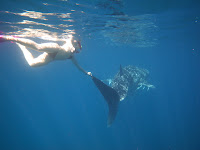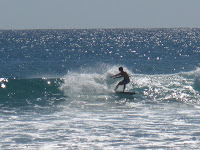 Measured up to 12 meters long, weighing 11 tons, and with a mouth more than 1.3 meters wide, whale sharks are the world's largest fish. While whale sharks are found throughout the world's tropical and warm water seas, anywhere between 200-400 whale sharks are seen on the outside of the Ningaloo Reef. Unlike all other sharks, whale sharks are filter-feeders, using modified gills slits to capture and digest krill, copepods, crab larvae, squid, jellyfish, and small fish, that happen to trapped. Aside from the possibility of getting sucked into their gigantic mouths, snorkelers or SCUBA divers wishing to swim with the whale sharks, can do so without worry. Admittedly, the true majesty of these animals cannot be experienced through photographs.
Measured up to 12 meters long, weighing 11 tons, and with a mouth more than 1.3 meters wide, whale sharks are the world's largest fish. While whale sharks are found throughout the world's tropical and warm water seas, anywhere between 200-400 whale sharks are seen on the outside of the Ningaloo Reef. Unlike all other sharks, whale sharks are filter-feeders, using modified gills slits to capture and digest krill, copepods, crab larvae, squid, jellyfish, and small fish, that happen to trapped. Aside from the possibility of getting sucked into their gigantic mouths, snorkelers or SCUBA divers wishing to swim with the whale sharks, can do so without worry. Admittedly, the true majesty of these animals cannot be experienced through photographs.Rather, one must be willing to take a dip in their underwater kingdom.
Fortunately, this is made possible by the dozen or so eco-tourism operations based in Exmouth. Essentially you shell out $300, and you get to spend a day in the Indian Ocean imitating the pesky remoras, pilot fish, and baby giant tevallies, which always seem to accompany the whale shark. While it's not clear whether the motor boats, and the humans that leap into the water from them, are a nuisance to the whale sharks, the Department of Conservation and Land Management have developed regulations about behavior around whale sharks. Touching whale sharks is strickly prohibited...
 However, while one is compelled to touch the graceful giant, it is unnecessary. The thrill of being with a whale shark comes from the beauty of light reflecting on its blue-grey skin which is riddled with white lines and dots. Appropriately colored like an aboriginal painting, one cannot help but be in high spirits after swimming with the attractive fish. When swimming with a whale shark, you forget everything else around you. Your heart might be racing, your snorkel may get choked a dozen times, giant turtles may pass by, but everything goes by unnoticed. What you remember is the silence, the sunlight, and the ease at which the whale shark glided through the water. Illumination...
However, while one is compelled to touch the graceful giant, it is unnecessary. The thrill of being with a whale shark comes from the beauty of light reflecting on its blue-grey skin which is riddled with white lines and dots. Appropriately colored like an aboriginal painting, one cannot help but be in high spirits after swimming with the attractive fish. When swimming with a whale shark, you forget everything else around you. Your heart might be racing, your snorkel may get choked a dozen times, giant turtles may pass by, but everything goes by unnoticed. What you remember is the silence, the sunlight, and the ease at which the whale shark glided through the water. Illumination... Sadly, the whale sharks leave the Ningaloo Reef in June, but mystery remains as to where they go. Regardless, you cannot keep spending $300 to swim with them, so you have to get your kicks elsewhere. Luckily, just as the whales sharks depart, Mother Nature ramps up the Indian Ocean swell!
Sadly, the whale sharks leave the Ningaloo Reef in June, but mystery remains as to where they go. Regardless, you cannot keep spending $300 to swim with them, so you have to get your kicks elsewhere. Luckily, just as the whales sharks depart, Mother Nature ramps up the Indian Ocean swell!
 Surfing is a popular sport in Exmouth, especially in the winter months (May-September) when southern ocean swell finds its way to the Northwest Cape.
Surfing is a popular sport in Exmouth, especially in the winter months (May-September) when southern ocean swell finds its way to the Northwest Cape.  Members of the Cape Boardriders Club may vary in age (5-65), but their enthusiasm
Members of the Cape Boardriders Club may vary in age (5-65), but their enthusiasm  to ride is unsurpassed. Unfortunately, most of the coast is sheltered by the Ningaloo Reef, and the existing beach breaks are oriented to the Northeast. So, surfers have to brave rather large waves over shallow reef, or they have to settle for smaller surf at the beach. Regardless, Exmouth is the northernmost coast of Western Australia to have waves. Furthermore, the crowds are minimal, especially on school days.
to ride is unsurpassed. Unfortunately, most of the coast is sheltered by the Ningaloo Reef, and the existing beach breaks are oriented to the Northeast. So, surfers have to brave rather large waves over shallow reef, or they have to settle for smaller surf at the beach. Regardless, Exmouth is the northernmost coast of Western Australia to have waves. Furthermore, the crowds are minimal, especially on school days.But the surf is still inconsistent. So, eventually you'll have to engage in the most popular sport in Exmouth... FISHING!!


It is really a nice place that anyone will really love to visit.
ReplyDeleteExmouth tours
CruiseNingaloo.com.au based in Exmouth offers hire and drive cruises for Ningaloo sailing. Explore the region with us as our trips are filled with great services. Our sailing cruises allow individuals to experience the region in great comfort and style.
ReplyDelete